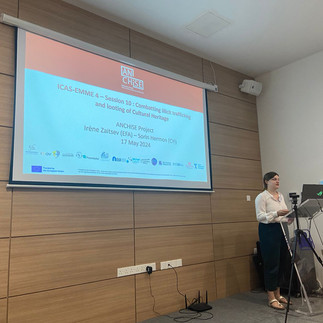A Multidisciplinary Approach to Protecting Cultural Heritage: Case Studies, Technological Innovations, and Collaborative Strategies Presented in Nicosia, Cyprus
An ANCHISE session titled ‘Combatting illicit trafficking and looting of Cultural Heritage’ was presented during the 4th International Congress on Archaeological Sciences in the Eastern Mediterranean and the Middle-East (ICAS-EMME 4), which was held in Nicosia (Cyprus) during 15-18 May 2024. The session was born in the context of the work the Cyprus Institute, and in particular the Andreas Pittas Art Characterization (APAC) Laboratories of the Science and Technology in Archaeology and Culture Research Centre (STARC), is doing within the European-funded project ANCHISE for combating the illicit trafficking and looting of cultural goods.
During the session, participants had the opportunity to listen to some interesting presentations about specific case studies and challenges that often arise with the prevention and fight of trafficking of antiquities. The session brought together six speakers from different cultural heritage professional backgrounds who looked at the problem from different perspectives but all focused on the impact of technology on the fight against the illicit trade in antiquities and cultural goods.
The session opened with an introduction of the session’s chairs who presented the social and cultural background of this world-wide problem. Moreover, they underlined the need not only of locating and utilising cutting-edge digital tools and analytical technologies but also focusing on the creation of novel approaches and strategies meant to thwart, halt, and uncover illicit activities that compromise the integrity of the global cultural patrimony.
The EMME region is one of the areas most affected by the phenomenon of looting and illicit trade in cultural goods. Because of Cyprus’ central position with respect to the EMME region and its long and troubled history of its cultural heritage being extensively excavated and exported in vast quantities, the session started with the island’s case study. The Department of Antiquities of Cyprus, which is the competent authority for the preservation, protection and promotion of the island’s listed monuments and movable antiquities, provided an overview of the related challenges. In particular, the issues faced by Cyprus as one of the so-called "source countries" (victims of looting) and the work carried out in combating these illegal activities were highlighted.
Researchers in the field of Cultural Heritage presented their scientific work. A contribution provided a sociological and technological analysis of the phenomenon. Since the illicit trade in antiquities has evolved significantly with the advent of technology, the presentation explored the ramifications of illicit antiquities e-commerce, the use of online databases, and the legislative and policy challenges posed by the intersection of technology and the illicit antiquities trade. Another contribution addressed the protection of specific typologies of cultural goods highly subject to illicit traffic. Interesting insights into the amount of items being sold online were presented; possible solutions to help discover their circulation, enhance understanding of the phenomenon, and protect them from the illicit trade were discussed.
The work of Law and Enforcement Agencies was presented by two important actors in the fight against the illicit traffic of cultural goods. One contribution highlighted the work of the Cyprus Police and the collaboration with technological partners, such as the Cyprus Institute, in developing and using advanced technologies to prevent and combat the looting of cultural heritage. Another presentation showcased the work of the Cultural Heritage Protection department of the Carabinieri Command. Operational activities, investigative efforts, and in-house development of technologies detailed the successful stories carried out by the specialised department in Italy and abroad.
The session rounded up with the presentation of the ANCHISE project and its activities towards an effective protection of cultural heritage in Europe and on a global scale. The multidisciplinary and comprehensive approach and the solutions developed as a response to the challenges of combatting the looting and illicit trafficking of cultural goods were highlighted.
Finally, the presentations led to a fruitful discussion amongst the participants and speakers regarding how technologies can help in the combating of illicit trafficking of antiquities and the importance of multidisciplinary collaboration in the fight.

*AI-Generated Image - Wix.com







Comments